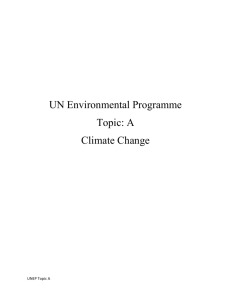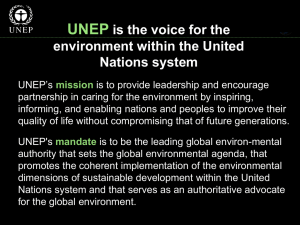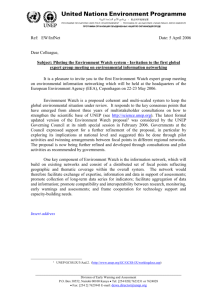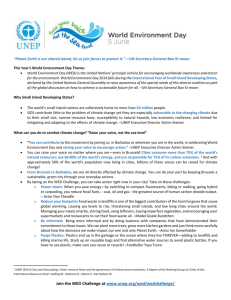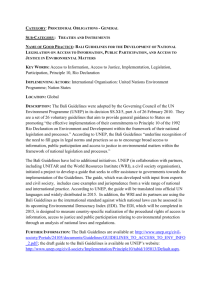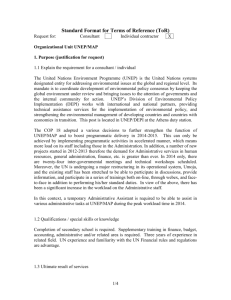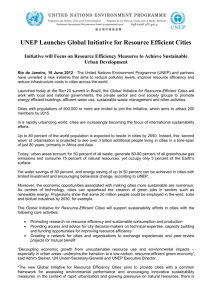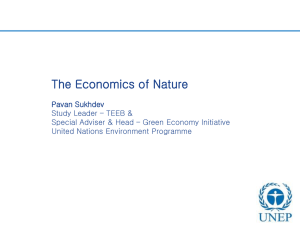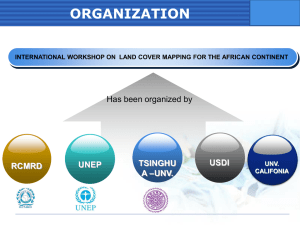Terms of Reference
advertisement
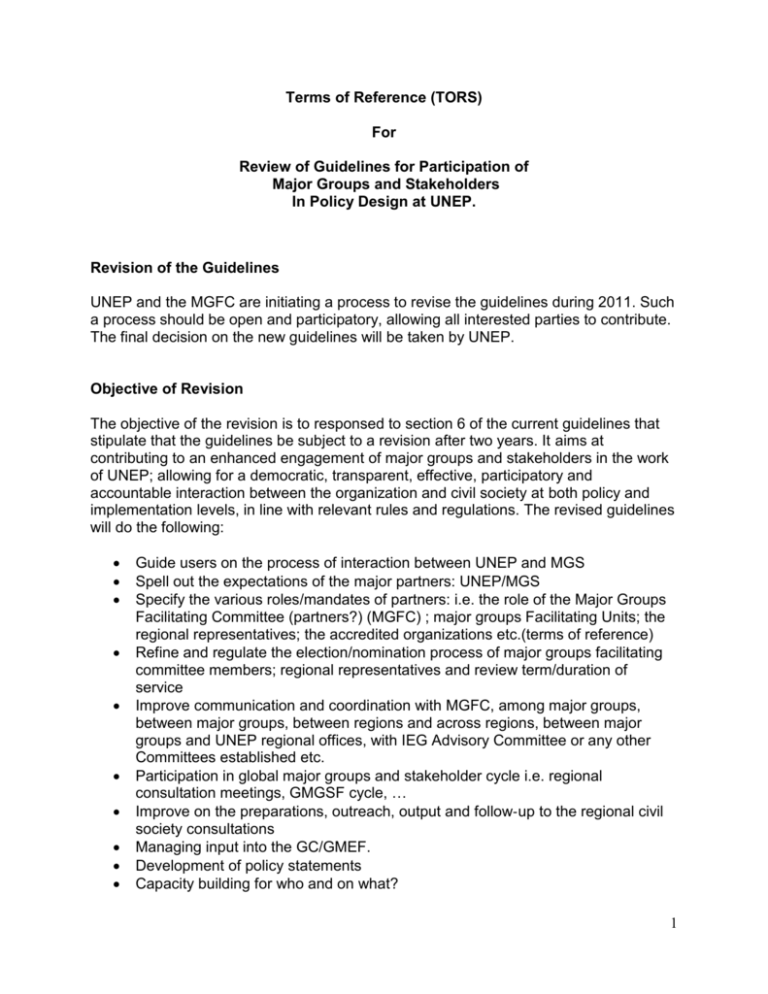
Terms of Reference (TORS) For Review of Guidelines for Participation of Major Groups and Stakeholders In Policy Design at UNEP. Revision of the Guidelines UNEP and the MGFC are initiating a process to revise the guidelines during 2011. Such a process should be open and participatory, allowing all interested parties to contribute. The final decision on the new guidelines will be taken by UNEP. Objective of Revision The objective of the revision is to responsed to section 6 of the current guidelines that stipulate that the guidelines be subject to a revision after two years. It aims at contributing to an enhanced engagement of major groups and stakeholders in the work of UNEP; allowing for a democratic, transparent, effective, participatory and accountable interaction between the organization and civil society at both policy and implementation levels, in line with relevant rules and regulations. The revised guidelines will do the following: Guide users on the process of interaction between UNEP and MGS Spell out the expectations of the major partners: UNEP/MGS Specify the various roles/mandates of partners: i.e. the role of the Major Groups Facilitating Committee (partners?) (MGFC) ; major groups Facilitating Units; the regional representatives; the accredited organizations etc.(terms of reference) Refine and regulate the election/nomination process of major groups facilitating committee members; regional representatives and review term/duration of service Improve communication and coordination with MGFC, among major groups, between major groups, between regions and across regions, between major groups and UNEP regional offices, with IEG Advisory Committee or any other Committees established etc. Participation in global major groups and stakeholder cycle i.e. regional consultation meetings, GMGSF cycle, … Improve on the preparations, outreach, output and follow‐up to the regional civil society consultations Managing input into the GC/GMEF. Development of policy statements Capacity building for who and on what? 1 Define contribution of MGS in UNEP’s development of internal policies, strategies, guidelines or standards would Policy and programme design Provide inputs regarding Programme implementation as it entails MGS involvement and participation. Maintain close links including to the Youth Outreach Unit managing the TUNZA programme through the MGSB Outline the increase in the number and diversity of actors - observers and constituencies in terms of the Rio Conventions – and reflect this variety of emerging actors in the structure of MGS and their interaction with UNEP I. Background Since its inception, the United Nations Environment Programme has enjoyed a special relationship with major groups in tackling environmental issues. Indeed, the Stockholm Conference on Human Environment, which led to the creation of UNEP in 1972, owed much to the enthusiasm, dedication and commitment of major groups and stakeholders. Many multilateral environmental agreements (Basel Convention, Montreal Protocol, Biodiversity, Desertification and Climate Change Conventions, etc) were developed thanks to the lobbying efforts of major groups and stakeholders. The 1992 “Earth Summit” declared that the involvement of Major Groups was necessary to achieve sustainable development and foster action to concretely implement agenda 21. As a result, in 1999 UNEP created a major groups & NGOs unit in the Policy Branch to provide major groups with a chance of broad participation in environmental decisionmaking. The following year, 2000, UNEP organized the first Global Civil Society Forum (GCSF) in conjunction with UNEP Governing Council / Global Ministerial Environment Forum as a main entry point for major groups’ participation at governance level. As a way of formalizing this engagement, UNEP Governing Council Decision 21/19, adopted in 2001, called for a “draft strategy for the active engagement of the civil society, private sector and other major groups in the work of UNEP” ;and in 2002 the Governing Council Decision SSVII.5, adopted the request that the “Executive Director continue the current practice of convening a civil society forum that is regionally balanced and representative in conjunction with the meetings of the GC/GMEF in close consultation with civil society.” This initial call for action in 2001 results in a UNEP that established three principal pillars for engaging with Major Groups and Stakeholders: governance and policy formulation; programme implementation; and an institutional framework. To implement this strategy, UNEP upgraded the Major Groups & NGOs Unit into a full branch - Major Groups and Stakeholder Branch (MGSB) in 2004. The Branch would continue to enhance the participation of major groups in UNEP’s work, taking into account major groups expertise and views at the intergovernmental level and involving them at in the implementation of the programme of work (POW). In 2006, changes were introduced to the Global Civil Society Forum (GCSF) cycle in order to improve the quality of 2 engagement with major groups, with in particular the creation of the Global Steering Committee with representatives from all regions in the GSCF process. This resulted in an increased ownership of the process by civil society organizations and in an improved major groups balance, and so taking into account major groups specific priorities. In addition to these changes, there was also an improvement in the type of dialogue sessions at the GC/GMEF with the introduction of ministerial small round-tables where major groups participate fully as well as in the plenary discussions and the Committee of the Whole, demonstrating that major groups’ voice was increasingly incorporated into the policy discussions at UNEP. This was anticipated to result in more partnerships with civil society for environmental policy development. MGSB put together A Draft Implementation Plan to enhance Major Groups’ engagement in the work of UNEP which was presented to participants 8th GCSF in 2007. The outcome of these discussed was a comprehensive document –“Guidelines on Improving the Global Civil Society Cycle”. These guidelines aimed to create a balanced and actively facilitated framework for managing major groups input to the UNEP governance process. The Civil Society Steering Committee was expanded to include nine (9) more members from the nine major groups. It was also renamed the Major Groups Facilitating Committee (MGFC) so as to be more representative - underlining the higher emphasis on the major groups criteria, and to provide guidance and coordinate the engagement of major groups in the GCSF cycle. In 2009 the guidelines were revised so as to be more clear, to create a balanced and actively facilitated framework for managing major groups and other stakeholders’ input to the UNEP governance processes, to be less process oriented and to reflect the envisaged partnership with UNEP in the implementation of its programme of work.The revised guidelines provided a vision for seeking greater participation from the nine Major Groups, recognizing that each Major Group has special interests that should be strengthened in a collaborative manner without sacrificing those unique interests within and among the Major Groups. For a start, the title of the guidelines changed “Guidelines for Participation of Major Groups and Stakeholders in policy Design at UNEP”. The guidelines also refer to major groups and stakeholders rather than civil society, in order to be more inclusive of all groups that are not government based. Related to this, the Global Civil Society Forum was also changed to Global Major Groups and Stakeholders Forum. The guidelines also stipulate that they undergo a further revision after two years. Expected Output: The main output of the review will be the Revised Guidelines (2011) for Participation of Major Groups and Stakeholders in Policy Design at UNEP document. II. Activities/Tasks: The review will include the following tasks: Review of current guidelines 3 Review paper by Regional representatives “ Improving regional Civil Society Contributions: Recommendations from the 2011 elected regional civil society representatives” Review of related documentation on civil society engagement e.g. paper by Sarah Svenson Review of GMGSF Outcome Evaluation reports of the past few years Review of similar guidelines from other UN agencies and elsewhere Invite input from current (and selected former) members of the MGFC including the regional representatives as well as accredited organizations Incorporate inputs into the guidelines Review the accreditation policy Prepare draft for discussion among accredited MGS Incorporate comments and finalize guidelines document for approval by UNEP ED The review process will be guided by UNEP’s Major Group and Stakeholder Branch and implemented by an editorial team consisting of members of the MGFC and UNEP’s MGSB. MGFC will review and provide input to the draft resulting from comments received and incorporated. III. Schedule: Comments to actual Guidelines are sent to MGSB by 30 September 2011 (Now extended to 15 October 2011). MGSB incorporate and finalise the new Guidelines by 30 October 2011 MGSB sends final version and allow second round of comments by 30 November 2011 MGSB send definitive version of Guidelines by 15 December 2011 4
